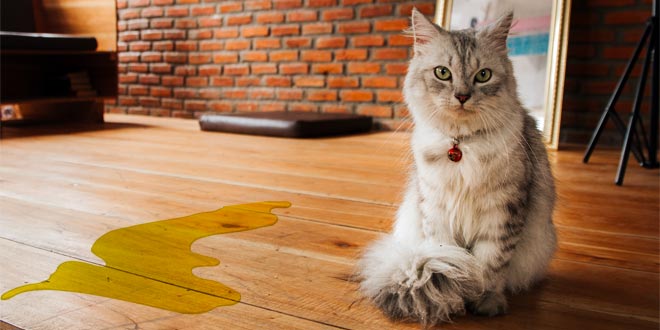
Unresolved feline anxiety can actually result in cat bladder infections, inflammations and pain. Here’s what you can do to prevent cat anxiety becoming a medical problem.
Symptoms of a feline bladder problem
Unmanaged cat anxiety can lead to some very serious medical consequences. Not only is she holding onto her pee, she will also often stop eating and drinking, so the urine becomes more and more concentrated. It is a VERY vicious circle.
It is almost never bacteria causing problems for these cats with cystitis, but the seeping of urine back into the inflamed lining causes more bleeding and pain. No wonder the cat goes to the tray time after time, hoping for relief and only passing small amounts of blood-tinged urine!
For the males, the sludge and alkaline urine form a plug which blocks their narrow urethra, leading to a metabolic crisis when they cannot pass urine. The urethral spasm alone, in some males, needs a full anaesthetic to release and allow urine to pass again.
You may not be able to spot all these symptoms but there are plenty of regular signs to watch out for.
- Straining to urinate, which is when the cat squats to urinate and stays in the same spot for a long time.
- Pain upon urination, when the cat gets a strained look on its face. Some even cry.
- Absence of urine, which is why you need to check the litter tray often.
- Frequent urination in different places. (Polyuria). Some cats keep looking for DIFFERENT PLACES to pee, since it hurt in the last place.
- Presence of blood within the urine.
- Strong smelling urine.
- More frequent trips to the litter box than usual.
- Crying.
- Over-all appearance of discomfort (or just doing nothing so the pain goes away for a while).
- Inability to sleep – often called hyper vigilance. This is an early warning that your cat’s brain has problems. Cats need deep sleep to restore their general and especially bladder health, just like we need proper sleep.
When a cat bladder infection gets serious
How serious? Watch my video on Treating Feline Cystitis in Male Cats.
- ALWAYS talk to your vet when the symptoms appear!
The moment you see your cat experiencing any symptoms associated with anxiety or a bladder infection, make an appointment. Hopefully, your vet knows your cat almost as well as you do and can give you advice based on your cat’s history. Your cat’s pain is real and inescapable and needs your attention. - Follow veterinary instruction to the T.
- Report adverse side effects to medications. Not all cats react in the same way to medication, so make sure to tell your vet right away if you notice anything.
- Work with your cat’s anxiety by determine the real source of the problem. (See more below). Your vet may give you some environmental modification (MEMO) information on how to help your cat feel less anxious.
